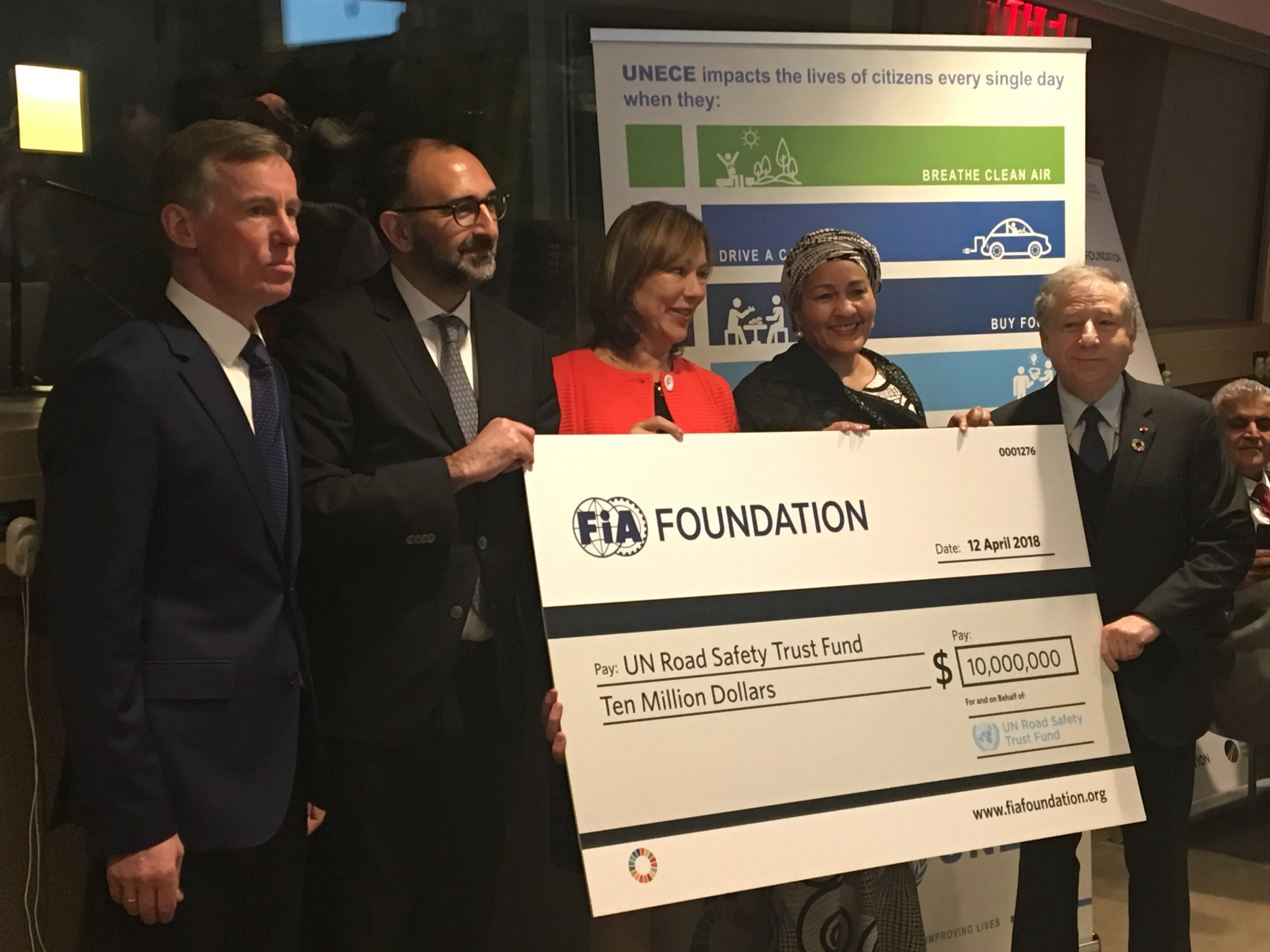The UN has set a global benchmark for reducing traffic fatalities on the world’s road network. Data shows that every year, almost 1.3 million people are killed in road crashes around the globe, according to information gathered by the World Health Organisation (WHO). In a bid to tackle this major problem, world leaders recently vowed to halve the number of global deaths and injuries from road traffic accidents by 2020. This target was agreed at the UN Sustainable Development Summit in New York.
October 21, 2015
Read time: 4 mins
The UN has set a global benchmark for reducing traffic fatalities on the world’s road network. Data shows that every year, almost 1.3 million people are killed in road crashes around the globe, according to information gathered by the 3263 World Health Organisation (WHO). In a bid to tackle this major problem, world leaders recently vowed to halve the number of global deaths and injuries from road traffic accidents by 2020. This target was agreed at the UN Sustainable Development Summit in New York.
The target of a 50% reduction in road deaths is more ambitious than the previous international commitment: The UN3439 Decade of Action for Road Safety, running from 2011 to 2020. This earlier bid set as its aim to first halt the rise in the number of road deaths and then begin to reduce them by 2020.
Achieving the new benchmark, codified as part of Sustainable Development Goal (or SDG) number 3.6, will require a drastic improvement in the implementation of highly effective road safety policies. It is a particular challenge for low and middle income countries which face rapid motorisation and where 90% of road fatalities occur.
“The1102 International Transport Forum welcomes ambitious targets for improved road safety,” said ITF Secretary General José Viegas. “Benchmarks for reducing the death toll on our roads should be set at all levels - global, national and local.”
“The new UN target is the most ambitious to date. The global community will have to draw on all the available expertise, resources and initiatives to move towards halving global road deaths as soon as possible”, added Viegas. “The ITF will do its best to share knowledge about good road safety policies and help to implement them.”
And in a move to further progress road safety, the ITF has launched four new reports to help policy makers choose the most effective approaches to improving road safety in their national context.
The first of these is titled: Improving Safety for Motorcycle, Scooter and Moped Riders. The number of powered two-wheelers (PTW) is growing. In many countries, they play an increasing role for mobility, notably in cities. But PTW riders are at a much higher risk than car drivers. In addition, PTWs have not benefitted from as many safety improvements as cars in recent years. This new report gives nine policy recommendations how to improve safety for riders of motorcycles, scooters and mopeds.
The second report is: Why does Road Safety Improve When Economic Times Are Hard? Are some of the recent reductions in the number of road deaths due the economic downturn and not to better road safety policies? Not only some but up to two thirds, argues this study underpinned by detailed statistical analysis. The report raises the possibility of a resurgence in road deaths as economic growth picks up and cautions policy makers to focus on the prepare for that moment now.
The third is: Road Infrastructure Safety Management. Road Infrastructure Safety Management (or RISM) refers to sets of procedures that support road authorities in decision making for the safety of a road network. This report describes the most consolidated RISM approaches, identifies best practices, weaknesses, barriers to implementation and gives 12 recommendations on how to save human lives through use of RISM procedures.
The fourth is: 2015 Road Safety Annual Report. This report provides the consistent, comparable road safety statistics and policy information across 38 countries, including the best-performing nations that achieve fewer than three road deaths per 100,000 inhabitants. The IRTAD report, as it is known for short, is an essential tool for policy makers wishing to gain an understanding of the successes and difficulties of road safety policy from an international perspective.
Another ITF Working Group is currently preparing a report on road safety as a safe system. This report will be published in late 2016 and build on the seminal report “Towards Zero: Ambitious Road Safety Targets and the Safe System Approach” (ITF, 2008).
The target of a 50% reduction in road deaths is more ambitious than the previous international commitment: The UN
Achieving the new benchmark, codified as part of Sustainable Development Goal (or SDG) number 3.6, will require a drastic improvement in the implementation of highly effective road safety policies. It is a particular challenge for low and middle income countries which face rapid motorisation and where 90% of road fatalities occur.
“The
“The new UN target is the most ambitious to date. The global community will have to draw on all the available expertise, resources and initiatives to move towards halving global road deaths as soon as possible”, added Viegas. “The ITF will do its best to share knowledge about good road safety policies and help to implement them.”
And in a move to further progress road safety, the ITF has launched four new reports to help policy makers choose the most effective approaches to improving road safety in their national context.
The first of these is titled: Improving Safety for Motorcycle, Scooter and Moped Riders. The number of powered two-wheelers (PTW) is growing. In many countries, they play an increasing role for mobility, notably in cities. But PTW riders are at a much higher risk than car drivers. In addition, PTWs have not benefitted from as many safety improvements as cars in recent years. This new report gives nine policy recommendations how to improve safety for riders of motorcycles, scooters and mopeds.
The second report is: Why does Road Safety Improve When Economic Times Are Hard? Are some of the recent reductions in the number of road deaths due the economic downturn and not to better road safety policies? Not only some but up to two thirds, argues this study underpinned by detailed statistical analysis. The report raises the possibility of a resurgence in road deaths as economic growth picks up and cautions policy makers to focus on the prepare for that moment now.
The third is: Road Infrastructure Safety Management. Road Infrastructure Safety Management (or RISM) refers to sets of procedures that support road authorities in decision making for the safety of a road network. This report describes the most consolidated RISM approaches, identifies best practices, weaknesses, barriers to implementation and gives 12 recommendations on how to save human lives through use of RISM procedures.
The fourth is: 2015 Road Safety Annual Report. This report provides the consistent, comparable road safety statistics and policy information across 38 countries, including the best-performing nations that achieve fewer than three road deaths per 100,000 inhabitants. The IRTAD report, as it is known for short, is an essential tool for policy makers wishing to gain an understanding of the successes and difficulties of road safety policy from an international perspective.
Another ITF Working Group is currently preparing a report on road safety as a safe system. This report will be published in late 2016 and build on the seminal report “Towards Zero: Ambitious Road Safety Targets and the Safe System Approach” (ITF, 2008).








